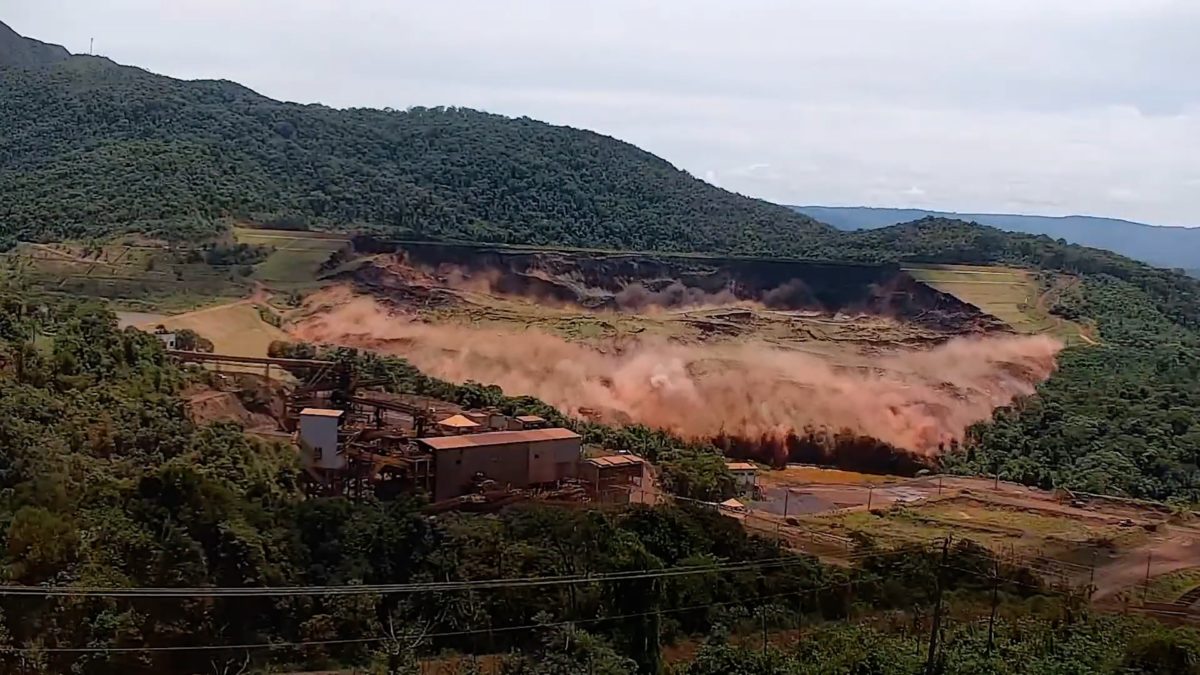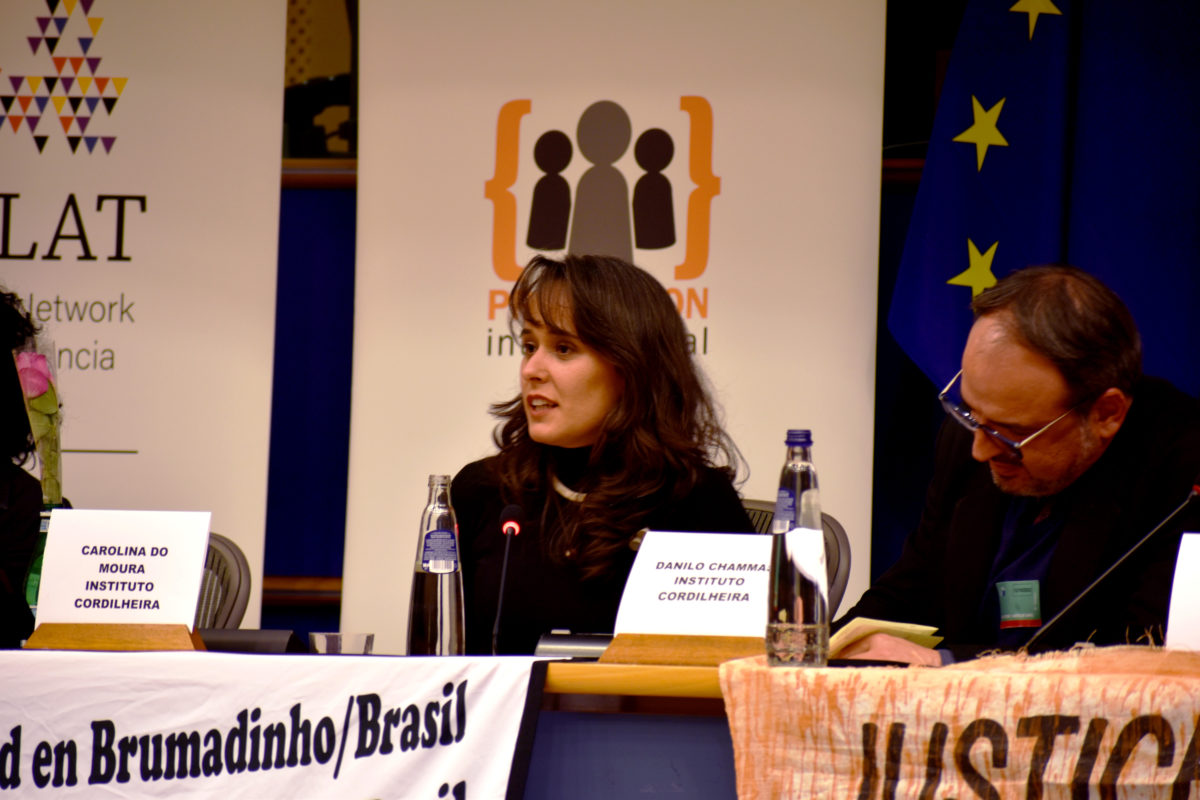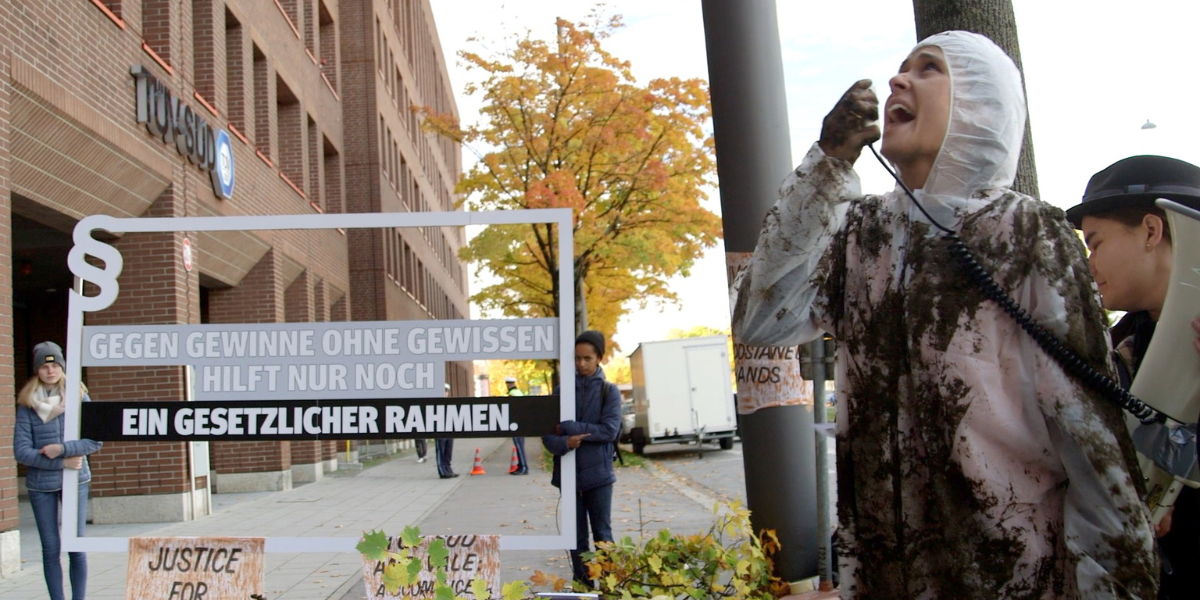Photo cover: The Illusion of Abundance.
The struggle of Carolina de Moura, journalist and activist at Instituto Cordillera, began almost eight years ago in her region, Minas Gerais, Brazil. Her life, just as the lives of many other people were turned upside down when a toxic mining waste dam of the company Vale S.A. burst in 2015. As a result, around 19 people died. It also affected the lives of 1.4 million people who depended on fishing and agriculture in the Doce River basin, which was contaminated by the 30.2 million cubic meters of waste.
But “the Mariana disaster” was not the only event that transformed their lives. Four years later, in 2019, another tailings dam, owned by Vale S.A., collapsed, causing a new toxic sludge spill in Brumadinho, which left 272 dead. This was yet another environmental crime committed by the company, and, to date, many victims have yet to find justice.
Faced with this tragedy, Carolina, together with her community, began her search for justice and denounced these and other damages caused by the extractive activities that continue to develop in her town. Her story and struggle have already reached many spaces of political discussion on corporate responsibility. Through her participation in the documentary “The Illusion of Abundance“, directed by Matthieu Lietaert and Erika Gonzalez Ramirez, she joins her voice to other defenders fighting for the respect of life and land.
We spoke with Carolina during one of her recent advocacy trips to Brussels. This time, about her work with women in her community and how she incorporates ecofeminism into action in her struggle.
What does ecofeminism mean to you and how did you become familiar with it?
Ecofeminism, to me, embodies the defense of both women’s rights and the rights of the Earth and nature. It involves standing up for our dignity and that of our comrades. Ultimately, it is about defending life and nature. Everything is connected.
A very strong vision that made a lot of sense in my path is to look at mining as patriarchy, representing the ultimate expression of patriarchal values in the world. If we look at the body of Mother Earth, what the mining companies do is to exploit, to dig a hole, and to leave a huge wound in the womb of Mother Earth, often without permission of the communities and much less of nature. This is a form of extreme violence to the body of Mother Earth and to the connection between our bodies and the Earth, our ‘cuerpo-territorio’.
There was one particular moment where I realized that ecofeminism resonated with me. I was at home, working on the land when I heard an explosion from a nearby mining site. I felt as if I were choking, I felt fear and a deep pain. It was in that moment that I understood perfectly the violence that is inflicted on the body of Mother Earth. I strongly felt the violence within my own body, I felt the ‘cuerpo-territorio’ connection.
How have you and your community been affected by the mining activity near your home?

We have been affected in several ways. Our access to water and land, and our ability to peacefully walk in the forest, for example, have been severely restricted. It has also affected our mental well-being as we witness our surroundings being destroyed, people losing their lives, and the significant impact on our community, which is now covered with mud and dust. So, on one side, we do not have good quality food and water, and on the other hand, there is all the uncertainty it generates. After the tragedy of the Mariana dam collapse and other tragedies caused by mining companies in my area, there is a constant fear that another tragedy could happen.
Also, women defenders have been impacted in a particular way, which I believe has to do with motherhood and care for their families. Because of our defence work, we put our bodies at the service of the community, we put ourselves and our families at risk. And this is also difficult.
Maintaining hope is a gigantic challenge. I’ve been advocating for the protection of the environment for nearly 20 years, and the situation continues to worsen. We achieve very little; the victories are very small. We’ve faced defeat countless times, but we still celebrate the victories. And even when we suffer a defeat, we did what had to be done, we left a mark, we mobilized more people. One thing that is very clear is that there are many more people now involved against mining projects in my area. Ten or 15 years ago there were only ten of us.
Do you know of any examples of ecofeminist alternatives to extractivism in your own surroundings?
Yes, there are many. I really dislike it when people say: “you are against mining, so how do you propose to develop the economy? What is the solution to generate jobs?”. It is cruel to burden us with the responsibility of proposing an economic solution within these capitalist parameters, which are destroying everything. I have many solutions to present and develop with the communities, but first, they must let us live, in peace, with dignity, and access to water, food and shelter from the cold. We can create many things, but how can we develop an economy while facing the threat of death and running out of water? How are we going to create and put energy in developing the alternatives when we have to dedicate all the energy we have so that they don’t kill us. I say this to shed light on many alternatives and possibilities that we can think of and create now because we are dealing with all this. Still, we have agroecology, medicinal plants, community tourism, cooperatives producing handicrafts, traditional foods and many things that we can do in networks, to exchange experiences, to create products.

I say that to throw the light, for many alternatives, possibilities that we even manage to think and create now because we are with all this, but still we have agroecology, medicinal plants, community tourism, cooperatives for the production of handicrafts, traditional foods and many things that we can do in network, to exchange experiences, to create products. We have set up some projects, for example, which allow women to generate an income from creating products that they learn to make in training workshops. So, I think there are many alternatives that are already there, but there’s no investment and political support for these alternatives. For some, the only economic alternative we have is mining or agribusiness. Because, of course, without investments and support for alternatives, how are we going to develop and compete with these giant, powerful transnational companies that impose their projects and suffocate all the alternatives that are there?
What is your opinion about the green transition?
We have total distrust in these false solutions, it makes no sense to change one raw material for another and say that now it is green and ecological because, in the end, it demands more raw materials and extractivism anyway. We are already suffering from the impacts of these extractivist projects, and now in addition there is an overexposure to the impacts of extreme climate events. I think there is a lot of lies and deception What else needs to happen before people decide to make the necessary changes? This energy transition pursued by governments and companies that come up with technologies that in the end also need raw materials, is of no use to us.
What’s the point of having a telephone and no water to drink? What quality of life is that? To have more and more stuff but no good water, good food, good air and intensifying natural disasters and environmental degradation.

